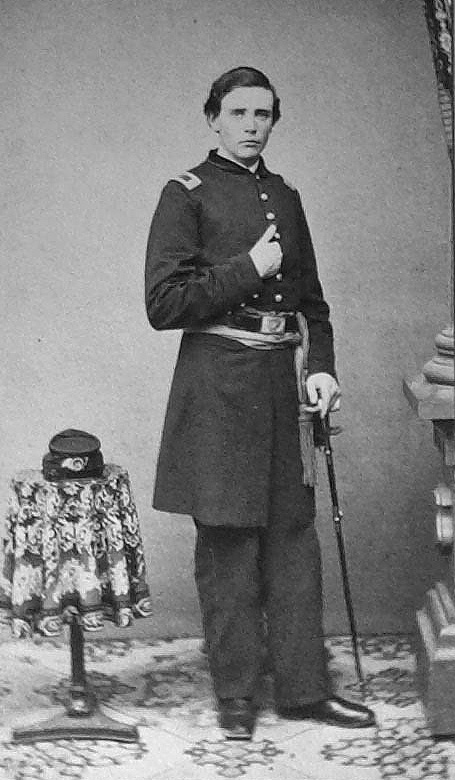|
Captain JAMES R. NICKELS (NICHOLS) |
||
|
Captain JAMES R. NICKELS (NICHOLS), was born in the town of Cherryfield, Maine, July 14th, 1843. Left an orphan at an early age, he removed to Norwich, to reside with an aunt, and that most picturesque and beautiful of New England cities was thenceforward his home. Here he made hosts of friends among the young lads of his age, and here was laid the foundation of a friendship toward young Nickels by the writer, that grew with his growth, and which makes him feel this brief memorial to be a most paltry tribute to one of the most generous and noble hearts that ever beat. Completing his school studies, Nickels entered the crockery store of R. M. Haven and became a member of his family. At the outbreak of the war he enlisted in Captain Harland’s Company of the 3d Connecticut Regiment, with which he passed creditably through the three months campaign, being particularly remarked for his coolness at the 1st Bull Run, where his company was one of the few from Connecticut that suffered any casualties. Returning home at the close of the campaign, he resumed his former avocation, devoting his spare time to the study of military tactics. His patriotism and adaptation to a military career were such, however, that he could not remain quietly at home, but on the President’s call for 50,000 men, in May, 1862, he again enlisted as a private in Co. E of the 14th. He was speedily made 1st sergeant, and left the state as such, Aug. 23d, 1862. In less than four weeks he passed with his regiment through the bloody fight of Antietam. At Fredericksburg, where fourteen out of eighteen officers were killed or wounded, Nickels escaped with his clothes riddled with bullets. Dec. 20th, 1862, he was commissioned 2d Lieutenant of Co. I, and in less than a month, Jan. 19th, 1863, promoted to be 1st Lieutenant of Co. K. That year he passed unscathed through the engagements of Chancellorsville, Antietam, and Bristoe station. On the 5th of November he was commissioned Captain of Co. I. In the campaign of 1864 he was with the regiment in the terrible carnage of the Wilderness, and Spottsylvania, the numerous minor engagements on the North and South Anna River, and at Cold Harbor. At the battle he commanded the regiment, and led it in a brilliant charge for which he was highly complimented by his brigade commander—the fearless Colonel Smyth. Through the constant fighting and perilous picket duty of that summer, in front of Petersburg, Nickels was ever at the post of duty, but never was scratched. But his hitherto uninterrupted career of success was terminated August 27th, 1864, in the struggle for the possession of the Weldon Railroad, known as the battle of Ream’s Station. Here he was severely wounded in the leg, and left on the field, where he was stripped by the rebels, who left him, not dreaming that he would survive the night. During the night his casualty was reported to the Regiment, when Adjutant Hincks, and Privates Goff and Rigney sought him out on the abandoned field, and bore him through the darkness eight miles into our lines. Such was the love he inspired, and such the devotion of the brave boys who risked their lives for him. Taken to City Point, he was removed to Armory Square Hospital, at Washington, where, after lingering six months, he died, Feb. 20th, 1865. Many times his prospects of recovery were deemed very fair, but the long confinement at last broke down his constitution—and with his faithful aunt and brother by his bed side, he quietly pined away, saying to his aunt, who told him of his situation, and pointed him to Christ, “It is all right with me.” Connecticut lost no nobler son in the war—a genial companion, a thorough officer always remarkable for his knowledge of and attention to his duties, loved and respected by his brother officers and men. He had won high encomiums from his superiors of all grades, and bid fair in time to have acquired more than a local reputation. His perfect coolness under fire, and his cheerfulness and freedom from despondency or irritability during his long and weary confinement to a hospital bed, show the prominent traits in his character-intrepidity, trustfulness, and amiability. Into twenty-one short years Capt. Nickels crowded a lifetime of noble deeds, and dying he left no enemy but mourning friends among his soldier comrades, school mates, and his townsmen. It was granted to him to live long enough to see the impending triumph of his country's cause, and to leave an untarnished name—“And so he laid his laurels down at his great Captain's feet.” |
||
